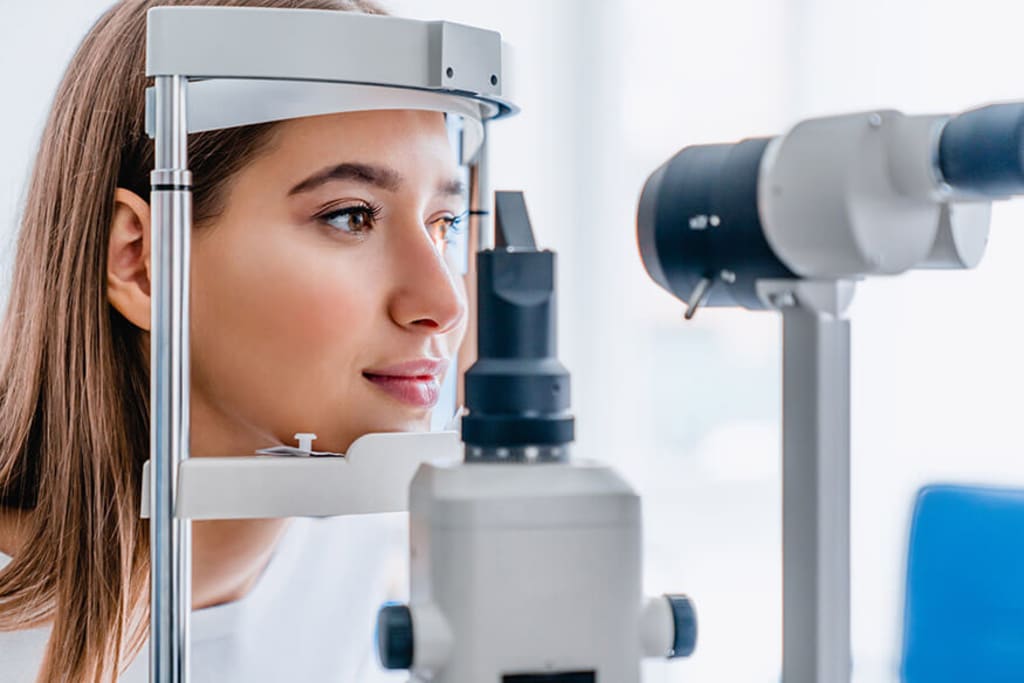Top 10 Signs That Indicate It's Time to Visit an Eye Doctor
Our eyes are extremely important in our daily lives because they enable us to experience the world around us. However, many people take their eye health for granted, dismissing warning signs that can indicate an underlying problem. Regular eye examinations are necessary for preserving proper vision and general eye health. In this article, we will explore 10 signs that strongly suggest it's time to schedule a visit to the eye doctor.

1. Blurred vision
Blurred vision is one of the most common and obvious warning signs that you should see an eye doctor. If you're having trouble seeing objects clearly, whether up close or far away, it might be due to a refractive error such as nearsightedness, farsightedness, or astigmatism. Blurred vision can sometimes be a sign of more serious diseases such as cataracts or glaucoma. An eye examination may help in the identification of the reason and the provision of suitable remedies, such as prescription glasses or contact lenses.
2. Frequent headaches
Persistent headaches can be caused by a variety of causes, one of which is eye strain. If you stare at screens, read, or perform other close-up work for long periods of time without taking breaks, your eyes may grow weary, resulting in headaches. An eye doctor can check your eyesight and, if necessary, prescribe corrective lenses. Moreover, they may advise on accurate eye care routines to prevent strain and headaches.
3. Eye fatigue and discomfort
If you regularly experience eye fatigue, discomfort, or a grittiness sensation, it can be a symptom of one of numerous eye diseases, such as dry eye syndrome or computer vision syndrome. Poor tear production or low tear quality can cause dry eyes, causing irritation and discomfort. An eye specialist may identify the cause of your symptoms and offer treatment options such as artificial tears or lifestyle changes that can reduce eye strain.
4. Double vision
Seeing double images is a disturbing sign that requires immediate care from an eye doctor. Diplopia, or double vision, can be caused by problems with the cornea, lens, or muscles that regulate eye movement. It might be an indication of a more significant underlying issue, such as a neurological condition or eye muscle imbalance. Seeking professional help is critical for identifying and treating the underlying cause of double vision.
5. Difficulty adjusting to light changes
If you have difficulty adjusting to changes in light, whether from a dark to a well-lit setting or vice versa, this can be a symptom of an eye condition. Photophobia, or sensitivity to light, can be associated with disorders such as cataracts, corneal abrasions, or inflammation. An eye exam is helpful in determining the cause of light sensitivity and suggesting suitable medical treatment.
6. Squinting
Squinting is an unconscious response to increase focus and vision clarity. If you catch yourself squinting more than usual, this can be a sign of an underlying problem with your vision. Squinting can be an unconscious way to compensate for refractive defects or other eye problems. An eye doctor may do a thorough eye exam to determine the reason and offer the best corrective approaches.
7. Distorted vision or seeing floaters
Vision distortion or a sudden appearance of floaters (small specks or cobweb-like structures in your field of vision) may suggest a problem with the vitreous gel inside your eyes. Floaters can be harmless, but they can also be a sign of more serious disorders such as retinal detachment or eye bleeding. Distorted vision can also be associated with macular degeneration. If you experience any of these symptoms, you should seek emergency medical assistance from an eye care specialist.
8. Changes in color vision
Any obvious changes in color vision, such as problems distinguishing between colors or perceiving a continuous yellow tint, could be signs of an eye condition. Color vision problems can be congenital or acquired, and they can be linked to disorders such as cataracts or macular degeneration. An eye doctor can evaluate your color vision and determine whether additional testing or corrective procedures are required.
9. Constant tearing
Excessive tearing or watery eyes can be caused by a wide range of conditions, including dry eye syndrome, allergies, or blocked tear ducts. While it can seem paradoxical, excessive watering of the eyes can suggest that your eyes aren't producing enough quality tears to keep them properly moisturized. An eye doctor can determine the underlying reason for your tearing and offer appropriate treatment options to restore your tear production balance.
10. Family history of eye conditions
If you have a family history of eye problems like glaucoma, macular degeneration, or retinal abnormalities, it is critical that you take charge of your eye health. Many eye disorders are inherited, and frequent eye exams can help discover possible problems early on. Knowing your family history allows your eye doctor to identify your risk factors and adopt preventive measures to ensure your eye health is at its best.
The bottom line
Taking care of your eyes is essential for general health, as is understanding the warning signs that indicate that you should go to the eye doctor. These indications, which range from changes in eyesight to discomfort and family history, should not be overlooked. Regular eye exams are critical for keeping excellent vision and avoiding complications. If you experience any of these symptoms, or if it's been a while since your last eye exam, make an appointment with an eye care professional to preserve your eyes' health and longevity.
About the Creator
Amelia Grant
I am journalist, and blogger.
Reader insights
Nice work
Very well written. Keep up the good work!
Top insight
On-point and relevant
Writing reflected the title & theme






Comments
There are no comments for this story
Be the first to respond and start the conversation.